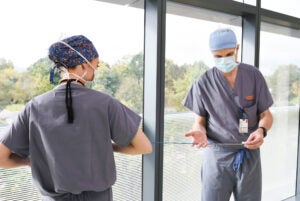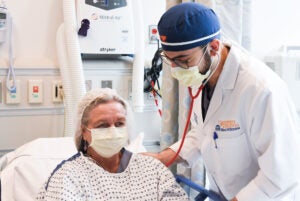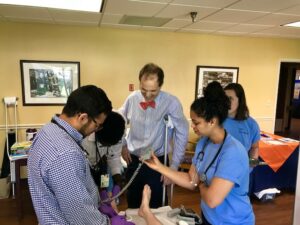Curriculum
 We offer up to three (3) categorical IR residency positions each year through the NRMP match (1737416A0). The VIR track has been phased out and replaced with the new 6-year interventional radiology (integrated) residency program. This 72-month program includes a Fundamental Clinical Skills (FCS) year at UVA Health, making the program categorical. The FCS year includes inpatient and outpatient surgical experience as well as management of patients in the intensive care units.
We offer up to three (3) categorical IR residency positions each year through the NRMP match (1737416A0). The VIR track has been phased out and replaced with the new 6-year interventional radiology (integrated) residency program. This 72-month program includes a Fundamental Clinical Skills (FCS) year at UVA Health, making the program categorical. The FCS year includes inpatient and outpatient surgical experience as well as management of patients in the intensive care units.
| PGY-1 | Fundamental Clinical Skills Year in the Department of Surgery at UVA Health |
| PGY-2 | Focused on diagnostic rotations and learning the fundamentals – 4 weeks of dedicated IR time – 4-week SICU rotation |
| PGY-3 | 9 months, diagnostic radiology – 2 months, vascular surgery, focusing on consults and endovascular cases – 4 weeks of dedicated IR time |
| PGY-4 | Final diagnostic year, preparing for Core exam – 4 weeks of dedicated IR time – Core exam |
| PGY-5 | Finish out diagnostic requirements, including nuclear medicine (16 weeks) and breast imaging (12 weeks) – 6 months IR – 3 months “AngioClinic” – 1 month dedicated research time |
| PGY-6 | 12 months IR – 2 weeks in VA setting – 1 month on non-invasive cardiovascular imaging rotation |
Residents can expect to experience the full gamut of Interventional Radiology, including oncology (including SIRT/Y90, TACE, and ablative techniques), peripheral arterial disease, aortic aneurysm and dissection repair, dialysis access creation/management, lymphatic interventions, portal venous management, biliary procedures, trauma intervention, UAE, PAE, gonadal vein embolization, and genitourinary work. In addition, residents will gain exposure and experience to a range of pediatric IR procedures while working with UVA Children’s Hospital. These include venous access, vascular malformations, CT/ultrasound guided biopsies, and drain placement.
“AngioClinic” Rotation
In the PGY-5 year, each resident will rotate through 3 months of AngioClinic. This rotation encompasses time on:
- IR clinic
- Neurointerventional Radiology procedures

- Vascular Medicine Clinic and inpatient consults
- Vein Clinic and outpatient procedures
- Dialysis Clinic
- Hepatology Clinic
- IR and hepatobiliary tumor board
- 1 month of dedicated research time
IR Related Rotations
Additional time will be spent on rotations such as neurointerventional radiology and noninvasive peripheral vascular lab. As a PGY-6, in addition to general IR call, residents will take stroke call with the NeuroIR team. Rotations on NeuroIR will allow residents to master catheter skills while treating complex cases including AVMs, aneurysms, carotid disease, and stroke.
Throughout the PGY-5 and PGY-6 years, residents will rotate in the peripheral vascular lab in order to complete the Registered Physician in Vascular Interpretation requirements.
Community Outreach
 IR residents, NPs, techs, and attendings support our community by participating in loco-regional peripheral artery disease (PAD) screening.
IR residents, NPs, techs, and attendings support our community by participating in loco-regional peripheral artery disease (PAD) screening.
Screening fairs run throughout the year with staff evaluating for PAD, aneurysms, and venous disease.
IR Clinic
During PGY 2-6, IR residents will cover IR clinic days, ensuring that they feel comfortable with the pre- and post-procedural care for our patients.
Dual Certificate in Interventional Radiology and Diagnostic Radiology
At the end of residency, and upon successfully passing the ABR Core and Certifying exams, the resident will receive a dual certificate in interventional and diagnostic radiology.
Early Specialization in Interventional Radiology (ESIR)
The purpose of ESIR is to offer an alternative pathway for diagnostic radiology residents who indicate an early wish to enter into Interventional Radiology (IR). ESIR training requires residents to complete 12 IR or IR-related rotations during their PGY2 – 5 years, with documentation of having performed 500 IR or IR-related procedures. Diagnostic radiology residents who select to complete the ESIR curriculum and meet the IR procedural requirements, may receive credit for year one, in the IR Residency (Independent), and directly enter into year two of the independent residency, completing training within six years.
The University of Virginia Diagnostic Radiology residency program has received ACGME accreditation and offers this opportunity to our trainees.
